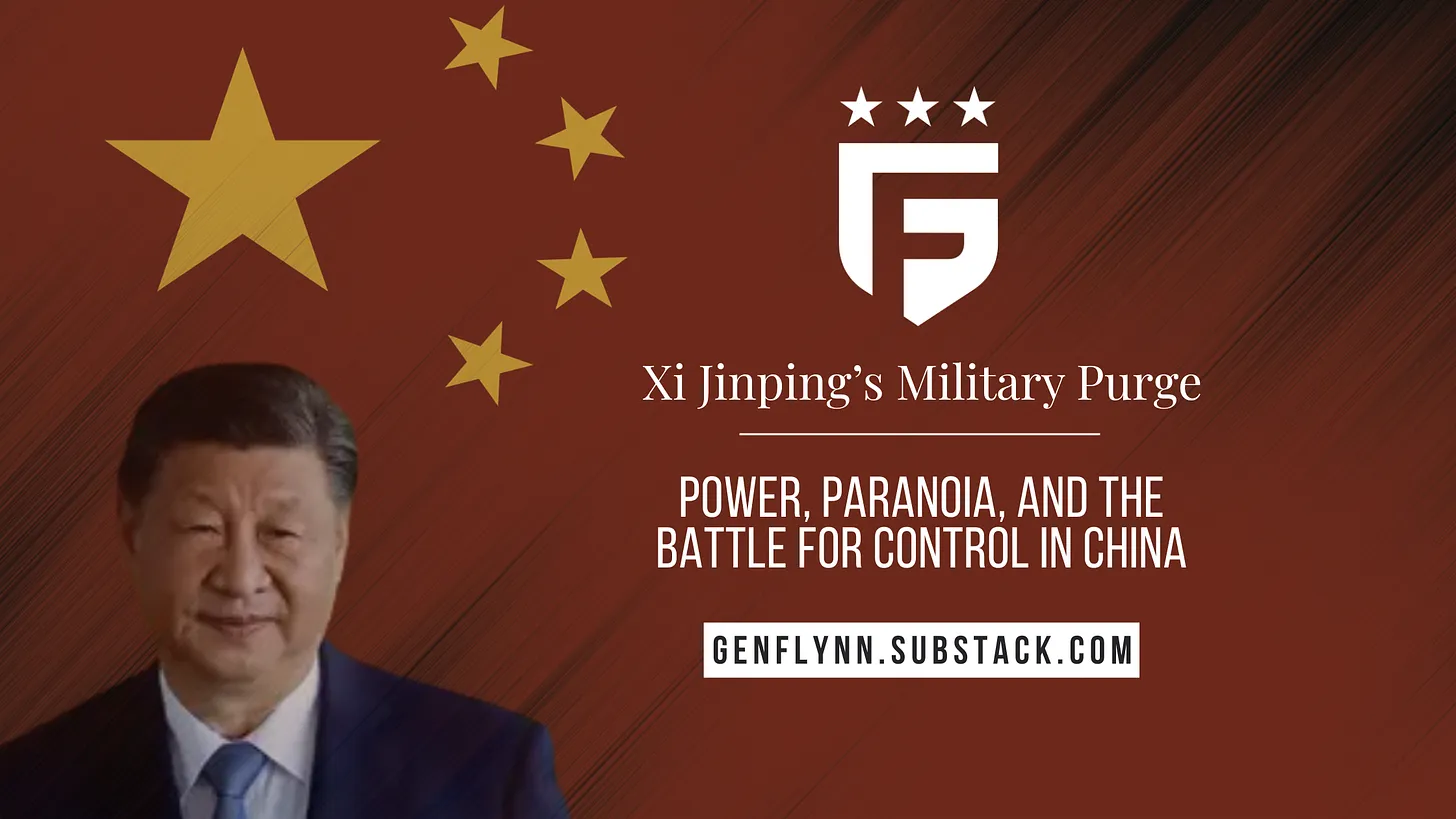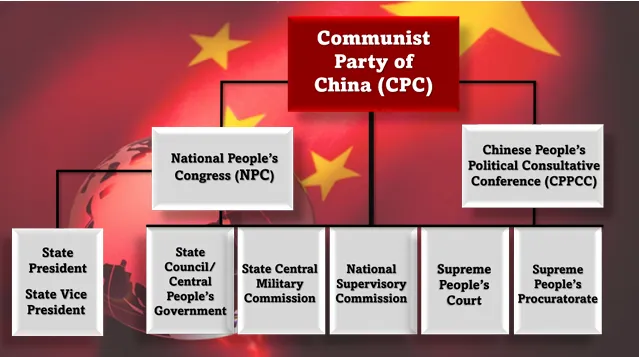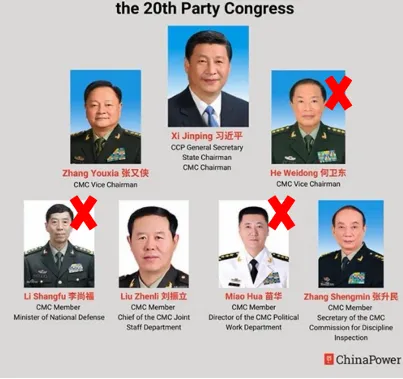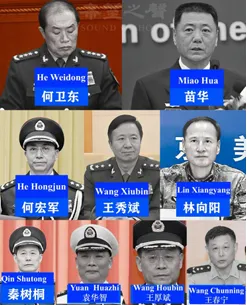
Posted on 10/23/2025 7:36:44 AM PDT by MtnClimber

In recent weeks, the world has witnessed a defining moment in the Xi Jinping era—a moment when the full weight of China’s political and military machinery has turned inward. From sweeping purges within the People’s Liberation Army to the Communist Party’s latest five-year planning session, it is clear that Xi is tightening the reins of control across every lever of state and society.
Xi Jinping is not merely the head of state; he is the state. As General Secretary of the Communist Party of China, President of the People’s Republic, and Chairman of the Central Military Commission, he holds the three keys that unlock every door of authority. The National People’s Congress formally elects the president and vice president, but in practice, it does not oversee their work. The real power flows from the Party, not from the state institutions that exist largely to legitimize decisions already made by the Party leadership.

The same dynamic applies to the military. The State Military Commission exists on paper, but the Party’s Central Military Commission is the true command structure of the Chinese armed forces. The so-called “Party commands the gun” principle remains the core of Xi’s leadership doctrine. Even China’s system of oversight reinforces Party dominance. The National Supervisory Commission operates jointly with and under the leadership of the Party’s Central Commission for Discipline Inspection. Together, they ensure ideological and political conformity within both state and military ranks. The Chinese People’s Political Consultative Conference, often portrayed as a space for diverse viewpoints, is mentioned in the state constitution’s preamble but excluded from the section on state institutions. Its advisory role serves one purpose to provide the illusion of consultation while reinforcing unity under Party leadership.
China’s long history has swung between unity and division, stability and upheaval. Since Mao Zedong’s victory in 1949, the Communist Party has maintained an unbroken monopoly on power. Since 2012, Xi Jinping has not only consolidated his control but restored the Party’s central role in every facet of Chinese life. He has merged Party and state into a single organism, where loyalty to the Party is indistinguishable from loyalty to Xi himself.
Today, Xi’s most immediate challenge is internal: to reshape, modernize, and control the military. The People’s Liberation Army has undergone sweeping reforms designed to strengthen joint operations, expand cyber and space capabilities, and project Chinese power far beyond its borders. But this modernization campaign has been matched by something darker, a campaign of purges and discipline that has reached into the highest levels of command.
Just this month, China expelled two of its most senior military leaders, including General He Weidong, the vice chairman of the Central Military Commission, and Admiral Miao Hua, the top political officer in the PLA. In total, nine senior commanders were purged in one of the most extensive shakeups in decades. Officially, the move was part of an “anti-corruption drive.” In reality, it was a loyalty test, a reminder that no one, no matter how powerful, stands above the Party or its supreme leader.

China purges 9 top commanders in People’s Liberation Army
Two of the top five men in the whole PLA, plus the heads or commissars of EVERY MAJOR BRANCH- Army, Navy, Rocket Force, Armed Police, and the main eastern theater command. These purges signal a fragile truth. For all of Xi’s control, the regime remains deeply concerned about the loyalty of its generals. Corruption charges in China’s military often serve as code for political disobedience, private networks of influence, or insufficient allegiance to Xi himself. The speed and scale of these removals suggest that Beijing sees internal cohesion as a matter of survival.
At the same time, Xi’s government continues to redefine the structure of the armed forces. The creation of new units like the Information Support Force underscores a shift toward data-driven warfare, cyber defense, and integrated command networks. It also ensures that the military’s technological brain communications, intelligence, and cyber capability remain directly under Xi’s supervision.
While Xi’s consolidation may appear absolute, there are hints of internal strain. Reports have surfaced of his absence from key international gatherings and rumors of growing discontent within the senior ranks. The Party’s own announcements suggest that new rules could allow Xi to delegate limited authority to trusted deputies, a move that could either strengthen the system or quietly prepare for an eventual transition. Yet beneath the appearance of order lies uncertainty. A purge of this scale carries risks. It can unsettle morale, disrupt command structures, and remove experienced officers in favor of loyal but less competent replacements. For a military that is rapidly expanding its reach, from the Taiwan Strait to the South China Sea, instability in the chain of command could lead to dangerous miscalculations.
What happens next depends on how successfully Xi can balance modernization with control. A stronger, more loyal military gives China the ability to project power and defend its interests abroad. But a military fearful of internal politics is one that may hesitate, or worse, act rashly to prove its loyalty.
For global observers, the message is clear: The Party rules the state, the state serves the Party, and the military belongs to both. China’s recent actions reflect a dual ambition to modernize its forces for twenty-first-century warfare while ensuring that no individual or institution can act independently of the Party’s will.
In essence, Xi fired nine generals because the leadership judged that the sum total of corruption, personnel malfeasance, contested loyalties, reform backsliding, and institutional network risks in the military had reached a threshold where action was required. The move advances a dual agenda: clean up the force and ensure it is loyal, modern, and tightly controlled. Whether this purge strengthens or weakens China’s military effectiveness in the near term will depend on how swiftly the command vacuum is filled, how capable the successors are, and whether the force can maintain momentum while undergoing discipline and structural change.

Top Flag & General Officers Investigated & Expelled from Party & Military
Xi Jinping’s third term was never about continuity; it was about consolidation. The events of the past week, expulsions, investigations, and renewed Party discipline all serve one end: to secure absolute control. Whether this makes China more stable or more brittle in the years ahead remains to be seen.
The world is watching a paradox unfold: a nation of 1.4 billion people governed by one Party, led by one man, and armed with a military that answers only to him. The purges may strengthen Xi in the short term, but they also expose the cracks beneath the surface of his power.
What follows may well determine not just the future of China but the balance of global power in the decade to come
This would very frightening if Harris was Present.
This is what the Democrat Party and others on the hard left want for America, and the entire world.
A global cow pen run by self-appointed ‘technocrats.”
The question is are the military men who were purged hawks or doves...
Everywhere that CCP is discussed call the men purged Xi’s allies, and that he is losing support. Only Flynn seems to think otherwise.
In China when their Fake Leader starts to lose power he starts to eliminate everyone around him ,LOL
The thought and words of the bloody Chairman Mao still resonate: “Political power comes from the barrel of the gun.” The only real threat to the Communist Party of China would be a failed military invasion of Taiwan, huge casualties in China’s combat inexperienced army of “one child” soldiers and failure of the military equipment they spent huge sums to develop and manufacture. The guys with the guns would be the soldiers leading a military coup against the corrupt CCP.
Not his allies from what I’ve been reading. Supposedly purged for corruption scandal.The plenum is in session right now to set out the next 5 year goal. I think the focus is going to be on rural economics, the elderly, and youth.
“Just this month, China expelled two of its most senior military leaders, including General He Weidong, the vice chairman of the Central Military Commission”
With a name like He Wei Dong — OnlyFans account is possible!
The corruption thing is Xi’s convenient excuse when it comes time to off his opponents. The Chinese government is the mafia writ large.
CC
The writer of this article is clueless as to what’s the internal party struggle in the cpc. He doesn’t know that all of the fired generals at Xi loyalists. He doesn’t know that Xi I opposed by two factions in the military and the party elders. He doesn’t know there is a climactic meeting taking place right now that will likely result in Xi losing some or all of his power.
Well, the predictions for a military backed ousting of Xi was for today, the last day of the plenum. They’re 10 hours ahead of me, so, I guess it didn’t happen.
Communique at the closing of the Plenum. Military mentioned.
China is a cruel and sadistic slaver state. This is precisely what so-called progressive leadership wants for America. They wouldn’t even blink at the sheer amount of mass murder necessary to achieve their goals.
Everywhere that CCP is discussed call the men purged Xi’s allies, and that he is losing support. Only Flynn seems to think otherwise.
Your thoughtful response restores the ambiguity.
There is only the revolution. Sometimes you have to break a few eggs.
Zhang Youxia purged them because they were Xi’s allies. Zhang is most likely to take over from Xi.
Disclaimer: Opinions posted on Free Republic are those of the individual posters and do not necessarily represent the opinion of Free Republic or its management. All materials posted herein are protected by copyright law and the exemption for fair use of copyrighted works.